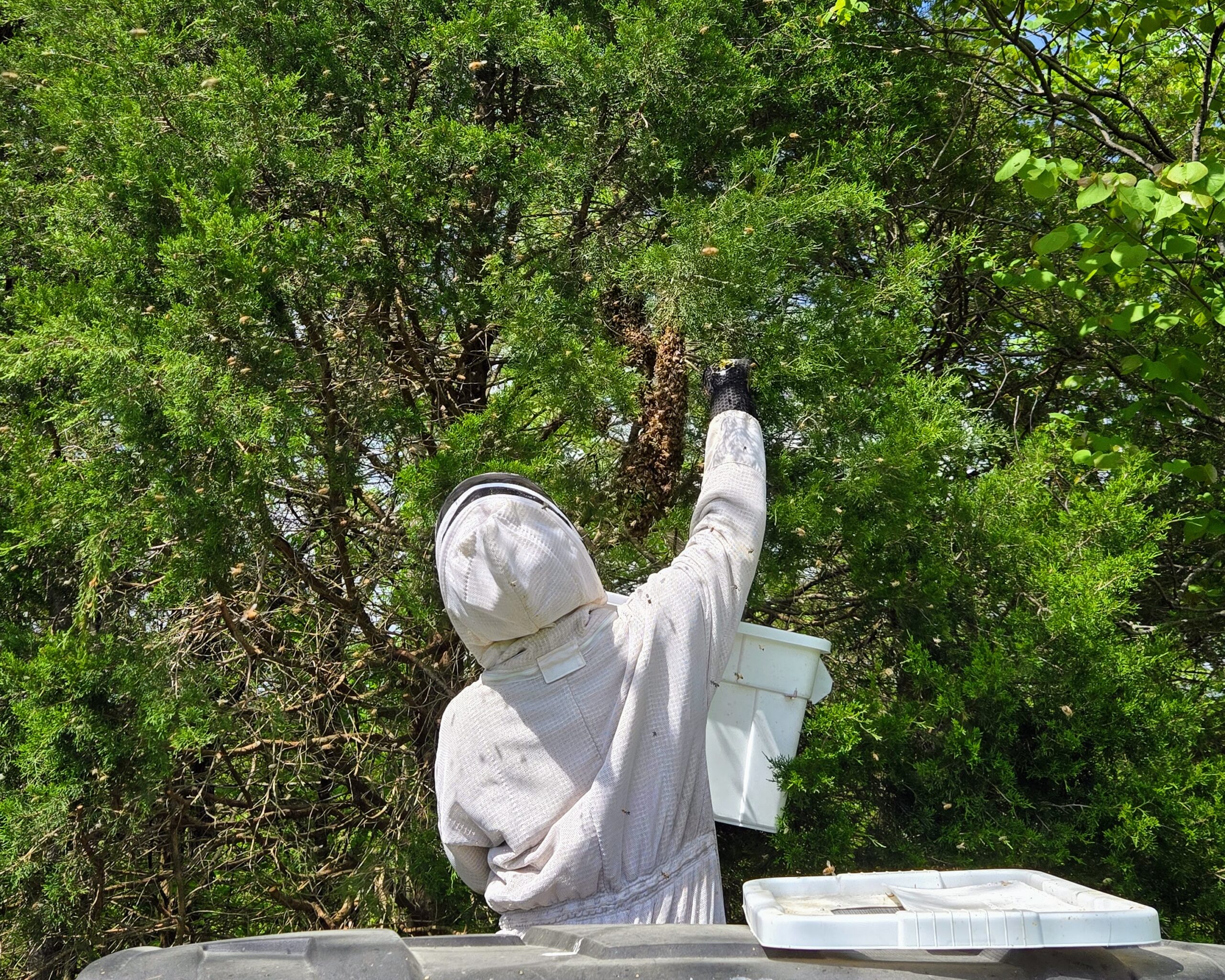Were You Expecting A Honey Bee Swarm?
Congratulations! Through some circumstance, hopefully not of your own doing, you have borne witness to the miracle of honey bee colony reproduction, also known as a honey bee swarm. If you are a beekeeper, you are often inclined to capture this swarm and give it a new home amongst your own apiaries. However, sometimes our apiaries, or our own sanity, cannot withstand another colony addition. Thankfully, whether you are a beekeeper or not, you can save your sanity and potentially your house, barn or any other undesired honey bee home by contacting the Apis Rescue Swarm Hotline for professional honey bee swarm removal in Kentucky.
Why Call Apis Rescue for Bee Swarm Removal?
What’s even better is that, by contacting the Apis Rescue Swarm Team, you can have a professional save the bees (and potentially your structures) all while adding to essential data which will be used to guide future honey bee breeding programs focused on honey bee mite resistance and survivability in Kentucky and the surrounding areas.
How the Bee Swarm Hotline Works
Once you call (502-233-2145) or email (swarm@apisrescue.org) the Apis Rescue Swarm Hotline, your call or email will be instantly aggregated to our more than 20 experienced and vetted beekeepers across the Kentuckiana area. Once a call is received, a beekeeper will contact you for further information on the exact location of the swarm, what structure the bees have chosen to land on (tree, bush, car, etc.), and the height our beekeepers will need to achieve in order to reach the swarm.
If the beekeeper who contacted you cannot arrive in your location within the hour they will pass this information on to the rest of the swarm team. Typically one of our team members will contact you and arrive within the hour to perform honey bee swarm removal before the bees have a chance to fly off. On the off chance that all of our many beekeepers are predisposed, we will release the swarm information to local beekeeping organizations (such as the Oldham County Beekeeping Association or The Kentuckiana Beekeepers), so don’t be surprised if you see a post of your bee swarm in Kentucky on a Facebook page with general information about the swarm and the area of town it is in. Any interested beekeepers will contact Apis Rescue to arrange to pick up the swarm.
What Happens When We Arrive
Once our swarm team member reaches your location, they will notify you of their arrival and, unless the swarm is glaringly obvious, ask for your assistance in locating the ball of homeless bees. If you do not intend on staying in the area, please notify the beekeeper prior to their arrival so they are not searching for both you and the bees. In these situations, time is really of the essence. When the bees have been located, the beekeeper will safely remove them from the premises and relocate them to their own apiary.
Structural Removals Are Different
Regrettably, there are times when the bees have already moved into structures where we don’t want them, typically a house or a garage. While you may call the swarm team hotline to request a removal, the answer will always be that, as a swarm team, we do not perform structural cut-outs. However, we do have a plethora of contacts in the area who do perform these removals located on our website: bee removal from structures. We encourage you to start there as a professional removal service will not damage your structure and in most cases will be able to fix what they remove.
Supporting Bee Research in Kentucky
Finally, once the swarm has been removed and is happily being managed by one of our nurturing beekeepers, you can rest assured that in the later fall months one of our researchers will inspect their hive to take essential data on honey bee genetics, mite load, heavy metal content and aggression that will be used to study the difference in feral and managed colony traits. These studies will be used to increase managed honey bee survivability and influence Kentucky breeding programs.
If you would like to participate in this study but want to keep all of the swarms you find, you can also purchase a citizen science kit from our merchandise store and receive a copy of your data, or you can join the swarm team in the 2026 season. Either way, we look forward to working with you as a valued member of the beekeeping community in Kentucky.
If you are interested in more information about honey bee swarms, check out our honey bee swarms page!
About the Author
Chris Ross is the President of Apis Rescue, a Kentucky-based nonprofit dedicated to honey bee conservation, research, education, and responsible beekeeping practices.

